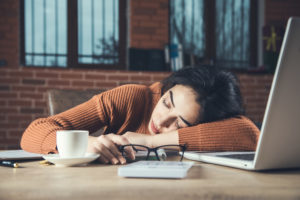
April 30, 2020
Are You Suffering From Hypersomnia? How Mindfulness Can Awaken You In More than One Way
Ever nodded off during a meeting or lapsed into a catnap while reading a novel on a Sunday afternoon? Maybe you’ve been practicing mindfulness when suddenly your head nods forward, startling you into the realization that you were sleeping instead of meditating.
We all feel sleepy during the day at times – particularly now as getting a solid night’s sleep is far more difficult with COVID-19 worries whirling in our minds. But some of us are sleepier than others during the day. In chronic cases, excessive daytime sleepiness is called hypersomnia.
Most of us are more familiar with hypersomnia’s raucous cousin – insomnia. While insomnia keeps us tossing and turning all night, hypersomnia does the opposite. It keeps us droopy-eyed during daylight. Before COVID-19, about 20% of us suffered from some form of excessive daytime sleepiness, though, that number might be higher as a result of the pandemic.
Learn how you can develop healthy patterns with mindfulness by registering for an upcoming Mindful Daily!
How to Know if You Have Hypersomnia
One of the hallmarks of hypersomnia is that you often feel tired and doze off during the day even if you’ve logged a full eight hours the night before. Also, people with hypersomnia sometimes have difficulty waking up from a nap and often feel groggy hours afterwards.
Hypersomnia is often a secondary cause of another medical condition unrelated to sleep such as diabetes or a result of side-effects from medication. It also can be related to underlying sleep issues such as sleep apnea or poor sleep habits. Sometimes, though, the exact cause of hypersomnia is unknown.
Because the quality of our sleep is so essential to our well being, how well or how poorly we sleep can be a mindfulness bell alerting us to pay attention. We often think of mindfulness as a moment-to-moment practice, but it’s also helpful in spotting patterns that develop over time in our lives.
Need a good night’s sleep? See how a mindfulness practice can help you develop habits that can lead to higher quality, restorative sleep with our 7 Days of Sleep on-demand content!
Using Mindfulness to Combat Poor Sleep and Hypersomnia
Whenever our sleep patterns are disrupted for an extended period, it’s worth pausing and reflecting on the circumstances in our lives and how we’re responding to them.
Maybe we’re simply trying to do too much, leaving us spent during the day. Perhaps we’ve lapsed into habits such as watching too much late-night television or drinking too much alcohol before bed, both of which can affect sleep. Maybe poor dietary habits over the years have crept up on us, leading to weight gain and possibly other medical conditions. It’s also worth noting if our mood feels consistently downbeat as medical experts believe there might be a link between depression and hypersomnia.
Whatever the circumstances may be, mindfully reflecting on our overall health and the habits that might be contributing to poor sleep or excessive sleepiness during the day can help us respond with self-compassion. We can then take practical steps to care for ourselves either by seeking medical help or making behavioral changes on our own.
Learn about neuroplasticity and how you can change your brain to be kinder and more compassionate with our Freedom Through Self Compassion on-demand content!
If you suspect excessive daytime sleepiness is because of a medical issue or related to the overall quality of nighttime sleep, it might be wise to make an appointment with your physician. Meanwhile, you can use mindfulness practice to become more aware of the habits that might be contributing to excessive sleepiness during the day.
Written by Kelly Barron, eM Life Teacher
